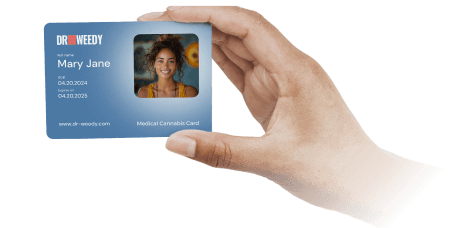Georgia medical marijuana card FAQ
Patients who are under 18 years old or disabled can select a caregiver under the Georgia Low THC Oil Registry. For patients who are still minors, their caregiver must be a legal parent or guardian.
Yes, your information is kept confidential. Under Georgia law (OCGA § 31-2A-18(f)), all records and information collected by the Georgia Department of Public Health (DPH) for administering the Low THC Oil Patient Registry are confidential. These records are not subject to public disclosure under Georgia's open records laws.
Disclosures are permitted only under specific circumstances, such as:
- Upon written request by the registered patient or their caregiver for information related to themselves.
- To peace officers and prosecuting attorneys for the purpose of verifying that an individual in possession of a registration card or low THC oil is registered under this Code section.
Furthermore, the Georgia Access to Medical Cannabis Commission does not process or issue Low THC Oil Registry cards, nor does it have access to patient information or the status of card orders. The Commission's role is limited to overseeing the production and distribution of low THC oil in the state.
Employers also don’t have access to Low THC Oil Registry records. However, it's important to note that while the law provides confidentiality protections, it does not explicitly prohibit employers from taking employment actions based on an employee's status as a medical cannabis patient. Patients should be aware of their employer's policies regarding medical cannabis use.
In Georgia, only licensed physicians with an active doctor-patient relationship can certify a patient for the use of low THC oil. According to Georgia law, the physician must be currently treating the patient for a qualifying medical condition or be providing care through a hospice program.
Before issuing a certification, the physician is also required to review the patient’s prescription history through the state’s Prescription Drug Monitoring Program (PDMP) to ensure safe and appropriate use. Once the certification is complete, the Georgia Department of Public Health issues the patient a Low THC Oil Registry card.
Caregivers may also receive a registry card if warranted by the patient’s condition. Physicians who certify patients must comply with reporting requirements, including submitting semiannual updates to the state detailing treatment outcomes, dosages, and any observed side effects. These reports help the state assess the effectiveness and safety of low THC oil for medical treatment.
Yes, to obtain a Low THC Oil Registry Card in Georgia, you must be a resident of the state. The Georgia Department of Public Health requires applicants to provide valid proof of residency, such as a Georgia-issued driver's license, state ID, passport, or other official documentation.
Additionally, Georgia law mandates that only residents certified by a physician licensed in the state are eligible for the Low THC Oil Registry.
Medicaid and private insurance does not cover low THC oil purchases. You must pay out of pocket for your THC oil purchases.
Registered patients with an active Low THC Oil Registry Card can legally purchase low THC oil from licensed dispensaries and select pharmacies in Georgia. These products are lab-tested for safety and regulated by the state.
You have two options for purchasing:
- Licensed medical cannabis dispensaries authorized by the Georgia Access to Medical Cannabis Commission: www.gmcc.ga.gov/patients/dispensaries
- Independent Low THC pharmacies licensed by the Georgia Board of Pharmacy: https://gadch.mylicense.com/verification/Search.aspx?facility=Y
You need to carry a Georgia-issued low THC oil registry card and your identification card when visiting a dispensary.
To apply for a medical marijuana card in Georgia, you need to first obtain a medical marijuana certification. Dr. Weedy offers an online evaluation at $139, with a guaranteed refund in case of denial. Once certified, you’ll need to pay a $30 state registration fee to receive your official Low THC Oil Registry Card. If paying online, a $3.75 service fee for using the payment portal applies.
If you don’t have access to email or the payment portal, you can mail a $30 money order instead. Send it to:
Georgia Department of Public Health
Attn: Low THC Oil Program
200 Piedmont Ave SE,
West Tower, Suite 1710
Atlanta, GA 30334
A low THC oil card in Georgia is valid for five years from the issue date. After five years, you can renew your card with a fee of $30.
To register with the Georgia Low THC Oil Program, follow the steps below:
- Schedule a meeting with a physician who will examine your medical condition and check if you are suitable for low THC use.
- If approved, you (and your caregiver, if applicable) must complete and notarize the Low THC Oil Waiver. You’ll also need to provide a valid form of identification—such as a driver's license, state-issued ID, passport, or military ID—for both yourself and your caregiver.
- The physician will submit the waiver and complete the necessary certification.
- The data from the forms will be entered into the Low THC Oil Registry.
- Pay a $30 registration fee for your Low THC Oil card.
- Once processed, your low THC oil card will be mailed to you or made available for pickup at a designated public health office. Processing typically takes around 10 business days.
To apply for a Low THC Oil Registry Card in Georgia, you must work with a certified physician who will submit the required documents to the Georgia Department of Public Health on your behalf. You will need to provide the following:
- Completed Waiver Form:
This form must be filled out and signed by both the patient and the certifying physician. It must also be notarized before submission. If a caregiver is being registered, the caregiver must also sign the form. - Physician Certification Form:
The certifying physician must complete this form, confirming that you have a qualifying medical condition or are receiving care through a hospice program. The physician must have an active doctor - patient relationship with you and must be treating you specifically for the condition for which low THC oil is recommended. - Valid Identification:
You must provide a valid government-issued photo ID, such as a Georgia driver's license, state ID, passport, or military ID. If you are appointing a caregiver, they must also provide valid identification. - Contact Information:
A working phone number and email address (if available) are needed to facilitate communication and digital access to payment and pickup instructions. - Payment:
A $30 registration fee is required. This can be paid online through the secure payment portal (an additional $3.75 service fee applies), or via mailed money order if you do not have online access.
Once the physician enters your details and uploads the documents into the state’s secure registry system, your application will be processed. If approved, your card will be sent to the public health office you selected for pickup, typically within 10 business days.
Yes, as of January 2025, telemedicine evaluations are permitted in Georgia for low THC oil certifications, in accordance with temporary federal guidelines. The Georgia Composite Medical Board has agreed to follow the DEA and HHS extension of COVID-era telemedicine flexibilities for controlled substances through December 31, 2025.
This means patients in Georgia can now:
- Complete their medical evaluation remotely with a Georgia-licensed physician for both new and renewal low THC oil certifications
- Submit all required documentation electronically through their certifying physician
- Pay the $30 state fee online via the Department of Public Health’s payment portal
- Receive notification for card pickup at one of the designated public health offices
However, this flexibility is temporary and subject to change after 2025, depending on final DEA telemedicine rules.
In Georgia, minors are not permitted to apply for a Low THC Oil Registry Card independently. However, if a minor is diagnosed with a qualifying medical condition, their parent, guardian or legal custodian can apply on their behalf as a caregiver.
Steps to obtain a Low THC Oil Card for a minor:
- Medical Evaluation: The minor must be evaluated by a Georgia-licensed physician who confirms the presence of a qualifying condition, such as severe autism, epilepsy, or cancer.
- Physician Certification: The physician will certify the minor's condition and submit the necessary information to the Georgia Department of Public Health's Low THC Oil Registry.
- Caregiver Registration: The parent or legal guardian must complete a waiver form, have it notarized, and provide valid identification. This information is submitted alongside the physician's certification.
- Payment: A $30 registration fee is required. This can be paid online through a secure portal or by mailing a money order to the Georgia Department of Public Health.
- Card Issuance: Upon processing, the Low THC Oil Registry Card will be mailed to the caregiver's address or made available for pickup at a designated public health office. The card is valid for five years.
To renew your low THC oil card, you should first visit your physician to conduct an examination. The physician will review your condition before you are issued a low THC oil recertification. The physician will complete the waiver form and certification form to complete the renewal process.
You can use the check status tool on low THC oil registry to check your renewal card status. The card will be available within 10 business days. To pick up the card, you need to provide a valid identification card.
You should renew your low THC oil card once it expires after five years. It is valid for five years from the issue date.
Caregiver cards are automatically renewed when the patient renews their cards after five years. Physicians submit caregiver information along with the patient’s certification and waiver forms.
Missing your renewal deadline can lead to a lapse in certification. You won’t be able to access low THC oil until you reapply for a new card.
Your card can be revoked if you disobey the related laws, like driving while consuming low THC oil and sharing your cannabis with non-licensed persons.
No, recreational marijuana is illegal in Georgia. It is a criminal offense to possess, buy, sell or cultivate marijuana for personal or non-medical use in the state.
However, medical marijuana is legal in limited form. Under Georgia’s Low THC Oil Program, registered patients with qualifying medical conditions may legally possess and use low THC oil—defined as cannabis oil containing no more than 5% THC by weight and at least an equal amount of CBD.
Approved forms of low THC oil products include: tinctures, lotions and topicals, transdermal patches and capsules.
Smoking or vaping marijuana is not permitted, even for medical purposes. Patients must be registered with the Georgia Department of Public Health and hold a valid Low THC Oil Registry Card to possess or use these products legally.
Medical marijuana patients cannot grow their cannabis in Georgia. Only businesses with a cultivator’s license can grow cannabis and manufacture low THC oil.
Purchases of low THC oil in Georgia are subject to the state’s standard 4% sales and use tax. As of 2025, Georgia does not impose any additional excise taxes specifically on low THC products. Therefore, patients and caregivers registered with the Low THC Oil Registry can expect to pay the standard state and local sales taxes when purchasing low THC oil from licensed dispensaries or pharmacies.
For the most accurate and current information on sales tax rates applicable to medical cannabis products in Georgia, it's advisable to consult the Georgia Department of Revenue or speak directly with a licensed dispensary.
Possessing a low THC oil card in Georgia can be seen as evidence of marijuana use by federal agencies, leading to the forfeiture of gun rights. Even though low THC oil products are not allowed to contain over 5% Delta-9 THC, anyone who uses a controlled substance is not permitted to possess or purchase firearms.
In Georgia, using low THC oil can still put your employment at risk. The state's low THC oil law does not require employers to accommodate the use of medical cannabis, even if you are a registered patient. Employers are allowed to maintain drug-free workplace policies and may discipline or terminate employees who test positive for marijuana, regardless of whether it's used for medical reasons.
Georgia law explicitly states that it does not limit an employer’s right to enforce a drug-testing policy or take employment actions based on a positive drug test result. Unlike some other states, Georgia does not offer employment protections for medical marijuana patients.
If you’re a registered patient, it’s important to understand your employer’s drug policy and be aware that medical use does not offer legal protection in the workplace.
Although Georgia law permits registered patients to use low THC oil for medical purposes, THC or marijuana remains illegal under federal law. This creates several important limitations:
- Federally subsidized housing: Residents of public or federally subsidized housing in Georgia may face eviction for using or possessing cannabis, even if it’s allowed under Georgia law. Federal housing programs must comply with the Controlled Substances Act, which still classifies marijuana as illegal.
- Employment with federal contractors or agencies: Individuals working for the federal government or for companies with federal contracts may be subject to zero-tolerance drug policies, and a positive THC test could result in disciplinary action or termination, regardless of state medical use protections.
- Gun ownership: Federal law prohibits marijuana users from purchasing or possessing firearms. Even registered medical marijuana patients in Georgia risk violating federal firearms regulations by owning or buying a gun.
- Crossing state lines: Transporting low THC oil across state lines—even between two states where it’s legal—can be considered interstate trafficking under federal law.
In summary, while Georgia permits the medical use of low THC oil, federal law does not, and patients should be aware of the risks in federally regulated spaces and activities.
There are no provisions made for the indoor or outdoor consumption of low THC oil in Georgia. It is illegal to smoke weed in Georgia, and marijuana is not available in a smokable form.
Get your medical marijuana card
Plant your health with Dr. Weedy. Get all the benefits of a medical card at a low price for a year





























